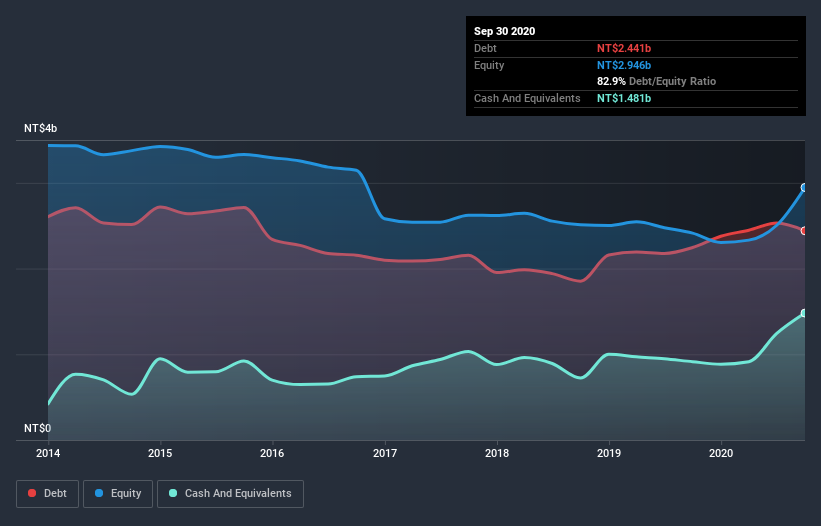
Legendary fund manager Li Lu (who Charlie Munger backed) once said, 'The biggest investment risk is not the volatility of prices, but whether you will suffer a permanent loss of capital.' So it might be obvious that you need to consider debt, when you think about how risky any given stock is, because too much debt can sink a company. Importantly, KNH Enterprise Co., Ltd. (TPE:9919) does carry debt. But the real question is whether this debt is making the company risky.
When Is Debt A Problem?
Debt assists a business until the business has trouble paying it off, either with new capital or with free cash flow. Ultimately, if the company can't fulfill its legal obligations to repay debt, shareholders could walk away with nothing. However, a more usual (but still expensive) situation is where a company must dilute shareholders at a cheap share price simply to get debt under control. Of course, plenty of companies use debt to fund growth, without any negative consequences. When we think about a company's use of debt, we first look at cash and debt together.
Check out our latest analysis for KNH Enterprise
What Is KNH Enterprise's Debt?
As you can see below, at the end of September 2020, KNH Enterprise had NT$2.44b of debt, up from NT$2.25b a year ago. Click the image for more detail. However, it also had NT$1.48b in cash, and so its net debt is NT$960.2m.

How Strong Is KNH Enterprise's Balance Sheet?
According to the last reported balance sheet, KNH Enterprise had liabilities of NT$2.03b due within 12 months, and liabilities of NT$1.61b due beyond 12 months. On the other hand, it had cash of NT$1.48b and NT$1.15b worth of receivables due within a year. So its liabilities total NT$1.01b more than the combination of its cash and short-term receivables.
Since publicly traded KNH Enterprise shares are worth a total of NT$6.20b, it seems unlikely that this level of liabilities would be a major threat. Having said that, it's clear that we should continue to monitor its balance sheet, lest it change for the worse.
We measure a company's debt load relative to its earnings power by looking at its net debt divided by its earnings before interest, tax, depreciation, and amortization (EBITDA) and by calculating how easily its earnings before interest and tax (EBIT) cover its interest expense (interest cover). Thus we consider debt relative to earnings both with and without depreciation and amortization expenses.
KNH Enterprise's net debt is only 1.1 times its EBITDA. And its EBIT easily covers its interest expense, being 16.3 times the size. So you could argue it is no more threatened by its debt than an elephant is by a mouse. It was also good to see that despite losing money on the EBIT line last year, KNH Enterprise turned things around in the last 12 months, delivering and EBIT of NT$688m. When analysing debt levels, the balance sheet is the obvious place to start. But you can't view debt in total isolation; since KNH Enterprise will need earnings to service that debt. So when considering debt, it's definitely worth looking at the earnings trend. Click here for an interactive snapshot.
Finally, a company can only pay off debt with cold hard cash, not accounting profits. So it is important to check how much of its earnings before interest and tax (EBIT) converts to actual free cash flow. Looking at the most recent year, KNH Enterprise recorded free cash flow of 49% of its EBIT, which is weaker than we'd expect. That's not great, when it comes to paying down debt.
Our View
The good news is that KNH Enterprise's demonstrated ability to cover its interest expense with its EBIT delights us like a fluffy puppy does a toddler. And its net debt to EBITDA is good too. Looking at all the aforementioned factors together, it strikes us that KNH Enterprise can handle its debt fairly comfortably. Of course, while this leverage can enhance returns on equity, it does bring more risk, so it's worth keeping an eye on this one. The balance sheet is clearly the area to focus on when you are analysing debt. However, not all investment risk resides within the balance sheet - far from it. For instance, we've identified 3 warning signs for KNH Enterprise that you should be aware of.
If, after all that, you're more interested in a fast growing company with a rock-solid balance sheet, then check out our list of net cash growth stocks without delay.
When trading KNH Enterprise or any other investment, use the platform considered by many to be the Professional's Gateway to the Worlds Market, Interactive Brokers. You get the lowest-cost* trading on stocks, options, futures, forex, bonds and funds worldwide from a single integrated account. Promoted
Valuation is complex, but we're here to simplify it.
Discover if KNH Enterprise might be undervalued or overvalued with our detailed analysis, featuring fair value estimates, potential risks, dividends, insider trades, and its financial condition.
Access Free AnalysisThis article by Simply Wall St is general in nature. It does not constitute a recommendation to buy or sell any stock, and does not take account of your objectives, or your financial situation. We aim to bring you long-term focused analysis driven by fundamental data. Note that our analysis may not factor in the latest price-sensitive company announcements or qualitative material. Simply Wall St has no position in any stocks mentioned.
*Interactive Brokers Rated Lowest Cost Broker by StockBrokers.com Annual Online Review 2020
Have feedback on this article? Concerned about the content? Get in touch with us directly. Alternatively, email editorial-team@simplywallst.com.
About TWSE:9919
KNH Enterprise
Engages in the manufacture and sale of household and hygiene goods, non-woven fabric products, and machinery equipment in Taiwan, China, Hong Kong, India, the United Kingdom, Japan, and internationally.
Low and slightly overvalued.
Similar Companies
Market Insights
Community Narratives


